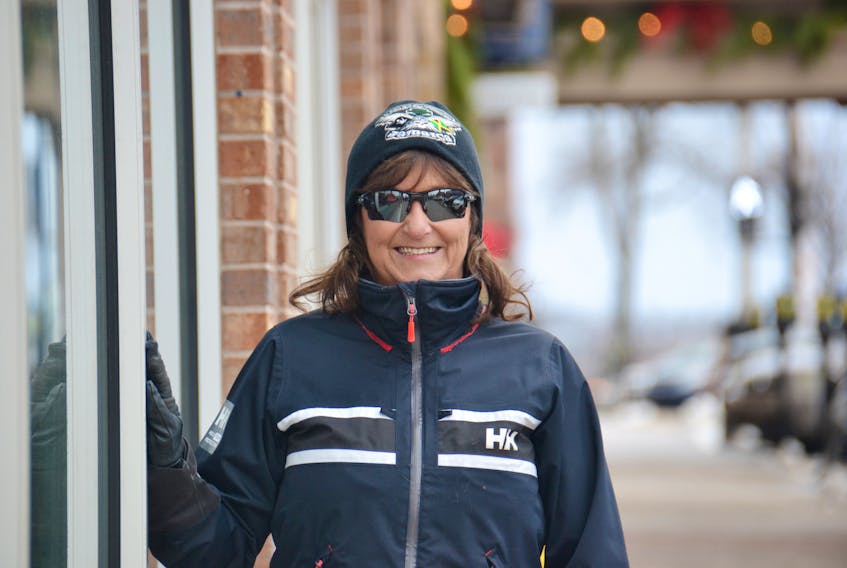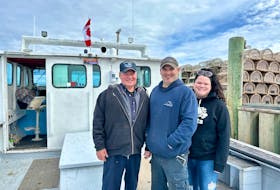CHARLOTTETOWN, P.E.I. - Tami Strictland-MacIntyre approaches panhandlers in Charlottetown with an ear to listen and a warm smile.
She takes them for food and hot drinks and does whatever she can to help.
Strictland-MacIntyre was hired by Downtown Charlottetown Inc. (DCI) earlier this year to lead its Navigator Street Outreach program. Her job is to find out who is on the streets, what their needs are and where to lead them for help. DCI first launched this program about two years ago, but the need is now more dire than ever with such a low vacancy rate in the capital city.
“I love it, I absolutely love it,’’ said Strictland-MacIntyre, who has been working with people on Charlottetown’s streets since May.
“You have to get the trust issue going. You have to be honest with them, and they have to trust you. You build a relationship, and that’s what I do.’’
She’ll ask what they’re looking for. If it’s food, she may bring them a sandwich or tell them the Salvation Army serves breakfast and coffee, that the soup kitchen offers lunch and supper and that the food bank has hampers available.
If they’re cold, she’ll make sure they get a hat or mittens or clean clothes.
If they’re open to finding a job, she’ll help them fill out an application or make sure they get help building a resume or get job counselling.
“You have to get the trust issue going. You have to be honest with them, and they have to trust you. You build a relationship, and that’s what I do.’’
-Tami Strictland-MacIntyre
Strictland-MacIntyre said she helped one man in his late 20s find a job.
“He was on the street with nowhere to live and he didn’t want to panhandle, so he reached out to me and I went with him. We got a (job) application done and I got him a job cutting grass with the city and I found him a place to live. He’s doing fantastic. He worked so darn hard that they kept him. He used to call me every single day and say how happy and appreciate he was. His whole life changed. That means a lot to me.’’
Strictland-MacIntyre said she simply applied for the job, describing herself as “very street smart’’.
Major Daniel Roode with the Salvation Army said the need for people on the street is real and it’s growing.
When the Salvation Army took over Bedford MacDonald House, a men’s shelter, in 2012 they averaged 300 to 400 shelter nights per year. Last year, that number grew to 1,200 shelter nights.
“We have seen a continued increase each year of people making use of that service,’’ Roode said. “The age range (of people staying at Bedford MacDonald House) can range from men in their late teens or early 20s right on up to their 70s and 80s.
“Some are local Islanders, some are transient, some are young, some are old, some are struggling with addictions, some are fleeing domestic violence situations which is kind of what people normally associate with women, but it can happen to men as well.’’
It’s a dry shelter meaning that men aren’t allowed in if they’re showing some form of intoxication.
“For a general population, to get a man off the street into a warm, clean, dry bed (and a) clean shower, it’s there. The Bedford MacDonald House feels more like a B&B than it does an institution because it is an old character home. It has that sense that you’ve come into a home.’’
“We have seen a continued increase each year of people making use of that service. The age range (of people staying at Bedford MacDonald House) can range from men in their late teens or early 20s right on up to their 70s and 80s. Some are local Islanders, some are transient, some are young, some are old, some are struggling with addictions, some are fleeing domestic violence situations which is kind of what people normally associate with women but it can happen to men as well.’’
-Major Daniel Roode
Roode said there has been a lot of discussion about the need for a women’s shelter, but the way forward is very challenging.
“You would have to have significant funding to do that,’’ he said. “It takes significant funding to (operate) Bedford MacDonald and, to be quite frank, that is a real challenge. There have to be key stakeholders and partners involved. Do I see that as a possibility in the future? Yes . . . but I think that’s an ongoing conversation into the community at different levels with different stakeholders.’’
Strictland-MacIntyre said a lot of people on the street find warmth at night wherever they can.
“A lot of them are alone and they couch surf . . . and stay where they can stay. They don’t have anybody, they really don’t,’’ she said.
Roode said homelessness is a multi-faceted issue.
“There is no silver bullet to fix this social concern,’’ Roode said. “I think on many fronts (we need to) find success in terms of improving employment, improving job skills, improving family life and relationship skills, (we need to) improve in the area of communication and education about addictions and addiction services . . . and, of course, the biggie is housing. All of these factors play a part.’’
The Guardian approached some people at a local coffee shop to see what their thoughts were.
“I think what (Strictland-MacIntyre) is doing is great,’’ said one man who didn’t want to give his name. “We’re all just a paycheque or two away from being in trouble.’’
Strictland-MacIntyre said the people on the street are not to be looked down on.
“They’re good people, they really are,’’ she said. “It could be my kid out there; it could be yours. Don’t ever judge. It’s not that easy to get off the streets when you have nobody and there’s nowhere to go.’’
[email protected]
Twitter.com/DveStewart









